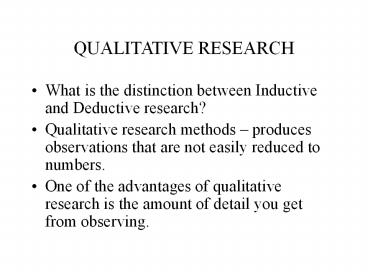QUALITATIVE RESEARCH - PowerPoint PPT Presentation
Title:
QUALITATIVE RESEARCH
Description:
QUALITATIVE RESEARCH What is the distinction between Inductive and Deductive research? Qualitative research methods produces observations that are not easily ... – PowerPoint PPT presentation
Number of Views:561
Avg rating:3.0/5.0
Title: QUALITATIVE RESEARCH
1
QUALITATIVE RESEARCH
- What is the distinction between Inductive and
Deductive research? - Qualitative research methods produces
observations that are not easily reduced to
numbers. - One of the advantages of qualitative research is
the amount of detail you get from observing.
2
- Appropriate for understanding issues within their
natural setting. - Appropriate for study of processes over time.
3
- Distinction between qualitative and experimental
or surveys - Collects primarily qualitative data.
- Exploratory research questions with commitment to
inductive reasoning. - A focus on previously unstudied processes and
unanticipated phenomena. - An orientation to social context.
4
- A focus on human subjectivity.
- PARTICIPANT OBSERVATION
- This is a method in which natural social
processes are studied as they happen in the
field.
5
- Participant Observer represents a continuum of
roles ranging from being a complete observer, to
being a covert participant. Most people develop a
role between these extremes.
6
Choosing a Site and Gaining Entry
- Where?
- something intrinsically interesting
- theoretically important
- careful with places you are familiar with
- involves non-probability quota, typical case
7
- Gaining Entry-
- in Participant Observation it is best to be vague
and imprecise but truthful - need to negotiate entry with gatekeepers
- need to negotiate confidentiality and ethics
- best to remain relatively passive in first few
days - need to get to know setting and people
- should also take notes on the entry
8
- Observation
- You want to watch as carefully as possible what
is going on. - Focus on your research question, but be very
broad in observing. - You need to be objective and impartial to what
you are observing
9
- Fieldnotes
- 1) Running Description
- Start by describing setting and date.
- Note events, movements, people, body language,
things heard and overheard, what time things
happened, event history log - Describe what you see in basic language.
10
- Try to separate interpretation from description
- At this point describe rather than analyze what
is going on.
11
- 2) Analytic Ideas and Interpretation
- Separately, take notes on ideas, and analysis as
they come up. - Think about how things fit into larger patterns
and context. - Even if ideas are crazy sounding, write them
down, dont rule anything out at this point.
12
- 3) Impressions and Personal Feelings
- Take record of your emotions and stressors
- Helps to separate emotions from what actually
happened, helps when you analyze notes later on.
13
- 4) Things to think about and do
- Make yourself a note to go back and fill in
blanks - If you saw something interesting one day, and are
going back into the field the next day, write it
down to remind yourself to look for it next day
14
- How many notes should you take?
- As many as possible.
- Remember this is your data, you want as much
detail as possible. - write down anything you can remember.
- Experienced fieldworkers say they take 10-13
pages of notes for every hour of observation.
15
- FOCUS GROUPS
- Focus groups are groups of unrelated individuals
that are formed by a researcher and then led in
group discussion of a topic.
16
UNOBTRUSIVE RESEARCH Group work
- Research Question
- You suspect that companies that manufacture mens
products are more likely to sponsor violent TV
shows than are other kinds of sponsors. Discuss
how you will go about conducting this kind of
research. - Start by defining mens products and what you
consider as violent and move on from there...
17
- These are methods used in studying social
behavior without affecting it. - There are three types of this kind of research
- a) Content Analysis
- b) Analysis of existing statistics
- c) Historical/comparative analysis
18
- Document Analysis- used to establish facts about
events which the researcher was unable to observe
directly. - Superior to informants in that official reports
and statistics cover sectors of the organization
beyond the sphere of an informant.
19
- CONTENT ANALYSIS
- This is the study of recorded human
communications.
20
- Questions for content analysis.
- Who says what? To whom, why, how, and with what
effect? - How is sampling done in content analysis?
- Might use simple, systematic sampling, stratified
random sampling.
21
- Unit of Analysis?
- You need to figure out your units of analysis
because this is what determines what kind of data
you will look for.
22
- CODING
- This is the process of transforming raw data into
a standardized form. - In content analysis you have to code any
communication, oral or written. - Others are coded according to some conceptual
framework conservative, liberal.
23
- Decide whether you want to code the manifest
content -- the visible, surface content. - Latent coding -- this when you code on the basis
of the underlying meaning.
24
- Summary of stages content analysis proceeds
- Identify a population of documents or other
textual sources for study. - Determine the units of analysis.
- Select a sample of units from the population.
- Design coding procedures for the variables to be
measured. - Test and refine the coding procedures.
- Base statistical analysis on counting
occurrences of particular words, themes, or
phrases, and test relations between different
variables.































